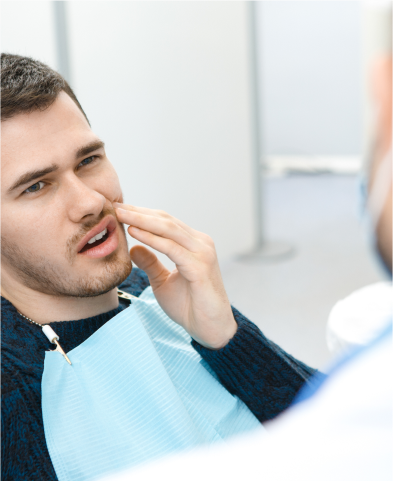TMJ Dysfunction
TMJ Dysfunction
TMJ Dysfunction, also known as temporomandibular joint disorder, refers to a group of conditions that cause pain and dysfunction in the jaw joint and the muscles controlling jaw movement. Symptoms can range from jaw pain, clicking or popping sounds, headaches, to difficulty chewing or opening the mouth. TMJ Dysfunction can be caused by multiple factors, including poor posture, stress-related teeth grinding, arthritis, or trauma to the jaw. Without proper care, the condition can worsen over time, significantly impacting daily activities and overall quality of life.
Our treatment philosophy for TMJ Dysfunction centers on addressing the underlying causes, not just the symptoms. We begin with a comprehensive assessment of jaw mobility, muscle tension, and joint alignment to accurately diagnose the dysfunction. Once identified, we implement a tailored care plan that may include manual therapy, therapeutic exercises, posture correction, and behavior modification techniques. Our goal is to reduce inflammation, improve joint mechanics, and restore natural, pain-free movement.
Clinical evidence supports the effectiveness of conservative TMJ Dysfunction treatments. According to the National Institute of Dental and Craniofacial Research, non-invasive therapies such as physical therapy, stress management, and bite appliances can relieve symptoms in the majority of patients. One study in the Journal of Oral & Facial Pain and Headache reported that patients who received targeted TMJ therapy experienced a 70–90% improvement in symptoms, including pain reduction and increased range of motion. These findings reinforce our commitment to delivering evidence-based, non-surgical solutions that lead to long-term relief and improved function.


What Can TMJ Therapy Treat:
TMJ therapy can help alleviate pain and discomfort in the jaw joint, face, neck, and shoulders that result from TMJ disorders.
It can improve jaw mobility and function, helping to reduce clicking, popping, or locking of the jaw.
TMJ therapy can help reduce headaches, including tension headaches and migraines, that are associated with TMJ disorders.
Therapy can address bruxism, which is the clenching or grinding of teeth, often associated with TMJ disorders.
TMJ therapy can help correct bite alignment issues, which can contribute to TMJ disorders and related symptoms.
Q&A
What is TMJ Therapy?
TMJ Therapy is a specialized treatment aimed at alleviating symptoms associated with temporomandibular joint (TMJ) disorders. It involves a range of techniques to relieve pain, restore function, and improve jaw movement.
What are TMJ disorders?
TMJ disorders refer to a group of conditions affecting the temporomandibular joint, which connects the jawbone to the skull. Symptoms can include jaw pain, clicking or popping sounds, difficulty chewing, and headaches.
What causes TMJ disorders?
TMJ disorders can be caused by various factors, including jaw injuries, arthritis, teeth grinding, misalignment of the jaw, and stress. Poor posture and muscle tension can also contribute to these conditions.
What does TMJ Therapy involve?
TMJ Therapy may include techniques such as manual therapy, jaw exercises, posture correction, and the use of splints or night guards. Treatment is personalized based on the individual’s specific symptoms and needs.
How long does TMJ Therapy take to show results?
The time it takes to see results from TMJ Therapy varies depending on the severity of the disorder and the individual’s response to treatment. Some patients experience relief within a few sessions, while others may require ongoing therapy.
Is TMJ Therapy painful?
TMJ Therapy is generally not painful. Some patients may experience mild discomfort or soreness during or after treatment, but this is usually temporary and resolves quickly.
Are there any side effects of TMJ Therapy?
Side effects are rare but may include temporary soreness or stiffness in the jaw. These effects typically resolve as the body adjusts to the treatment.
How many TMJ Therapy sessions will I need?
The number of sessions required depends on the severity of the TMJ disorder and the individual’s response to therapy. Your therapist will work with you to develop a personalized treatment plan.
Can TMJ Therapy be combined with other treatments?
Yes, TMJ Therapy can be combined with other treatments such as medication, dental care, and lifestyle modifications to enhance overall effectiveness and improve outcomes.
Is TMJ Therapy covered by insurance?
Coverage for TMJ Therapy varies by insurance provider and plan. It is recommended to check with your insurance company to confirm coverage and any potential out-of-pocket costs.
What Customers Are Saying
Our Process
How It Works?
Reach out to us via our online form or call to schedule an initial assessment.
Based on your unique needs, we develop a tailored therapy program.
Our professionals guide you through each session, focusing on effective rehabilitation.


